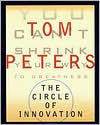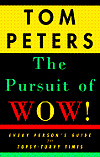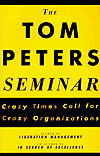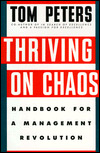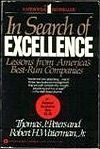I was first introduced to Tom  Peters work and ideas in 1994 when I attended a seminar in London. The seminar was based on the Tom Peters and Robert H. Waterman book "In Search of Excellence". The encounter with Tom Peters work was inspiring and opened up my horizon to new way of doing things.
Peters work and ideas in 1994 when I attended a seminar in London. The seminar was based on the Tom Peters and Robert H. Waterman book "In Search of Excellence". The encounter with Tom Peters work was inspiring and opened up my horizon to new way of doing things.
Later the same year I attended a seminar in Stockholm, Sweden "Beyond Business as usual" here I saw Tom Peters on stage - it was an inspiring performance.
To me, Tom Peters represents the essence of an American management guru, for better and for worse.
"For better" because he in a great and inspiring way communicates new management thoughts and ideas - usually originating from the USA where open mindedness still exists, where people pursuing their dreams are hailed and where diversity is a called upon - not frowned upon.
"For worse" because he as most other management gurus tend not to put his ideas into a context of society, environment, use of resources, etc.
No doubt we need to focus more commited on business than we do today in Europe - but we are all a part of the society we live in - we should all put ideas and concepts into the wider context of society and environment.
But let there be no doubt - I'm a Tom Peters fan!
Since his first book "In Search of Excellence" I have read many of his books, "Thriving on Chaos", "Crazy Times Call for Crazy Organizations", "The Pursuit of WOW!", "The Circle of Innovation", "Re-imagine! Business Excellence in a Disruptive Age", "The Little BIG Things: 163 Ways to Pursue EXCELLENCE".
Throughout his books Tom Peters are passioned about the hunt for the "sacred cows" of the business world, business excellence, empowerment of people, and the search for the essence of innovation and development of new ideas.
"In Search of Excellence" is often highlighted as his best and most important book - when it came out in 1982 it had a whole new approach to business management.
Re-imagine from 2003 is one of his best. In this book he seriously addresses how much business has changed - Burn the old management books - the old rules are no more - it's better to destruct and re-imagine your business than continuing business as usual with a Kaizan approach of on going improvements.
Documenting the allegation Tom Peters quotes Richard Foster and Sarah Kaplan's book Creative Destruction: Why Companies That Are Built to Last Underperform the Market. Foster and Kaplan had looked at "Standard & Poor's top 500", a list of 500 top companies in the USA. The "Standard & Poor's top 500" came around in 1957, 40 years later only 74 of the 500 companies were still alive - 85% deceased... and only twelve, 12! (2,4%) had out performed the market (in terms of adding value). So " The Market" where companies are born and die all the time has over 40 year created more value than 488 of the larges 500 companies, who should have had the optimum conditions and were run by the best and highest paid professional leaders.....
”Incrementalism is innovations worst enomy" - Nicholas Negroponte.
The above shows better than anything how important it is for a society to provide the best conditions for innovation and establishing and starting up business - the current top dogs simply won't survive. If new companies/business are not born in a steady stream, especially in the "age of knowledge" where things are moving faster and the turnover of companies are higher than ever before, we will see an unprecedented decline in living standards in the western world.
Especially in Europe, where "business as usual", state subsidies for agriculture and existing business is still widely used we are going to have a problem if we do not instead start focusing on providing an environment where new business ideas thrive....
State subsidies are much more damaging to innovation than "incrementalism" - why develop new when the state pays us to do what we are already doing?
In my view "In Search of Excellence" and "Re-imagine!" ought to be on the literature list in any education related to company management, organization and development. The fact that I include "In Search of Excellence" from 1982 illustrates how little I have seen management ideas and attitudes evolve over the last 30 years.






